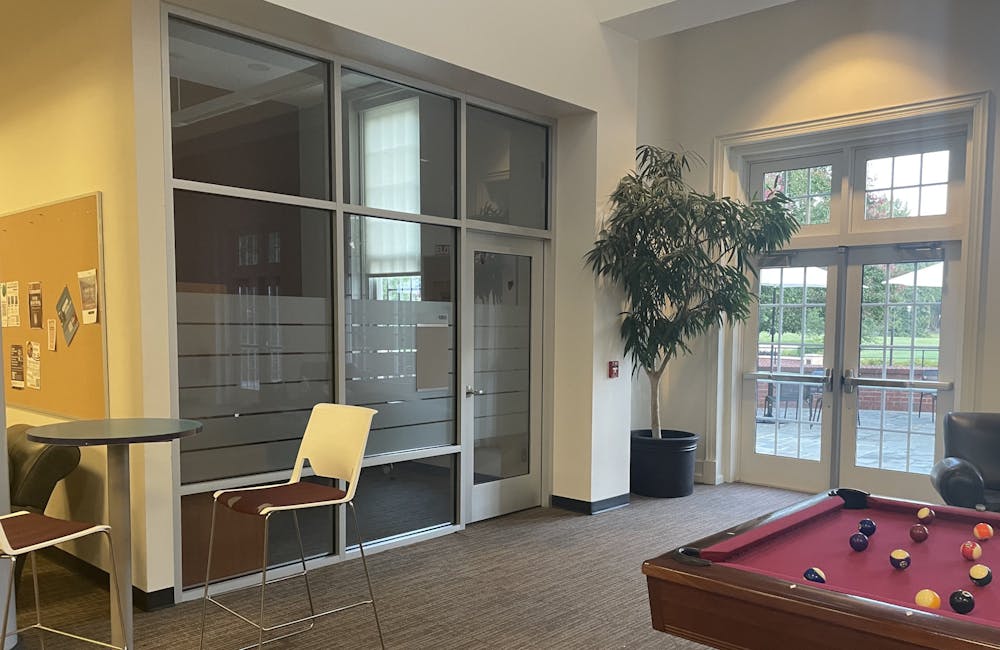When Kenneth Brown Jr. ’19 was a student at Elon University, there weren’t any dedicated initiatives for first-generation student success. Now, he’s the assistant director of Elon’s First-Generation Student Support Services and a co-adviser for the First-Generation Society.
“It’s something I wish was around when I was a student,” Brown said.
The First-Generation Society was established in 2021 as a student-driven organization to support, build community with and advocate for first-generation students on campus. Starting this semester, the First-Generation Society will have an office on the first floor of the Moseley student center in room 105E.
Senior Ja’Mya McKoy is the organization’s president, but said she didn’t always understand the way her first-generation identity impacted her college experience.
“I didn't understand what first-gen identity meant until I met Kenneth,” McKoy said.
Now, McKoy is a first-generation mentor, and said she aims to be a role model to students on campus. The support McKoy received from Brown, the First-Generation Student Support Services and the First-Generation Society helped her feel empowered in her first-generation identity, she said.
McKoy said she’s noticed first-generation students at other colleges don’t always have the community and advocacy resources that Elon does. Especially for freshmen, McKoy said first-generation identity can get “washed away” or has a negative connotation.
“Having a first-gen office and being able to hear students' opinions and hear student voices and advocate for them can also change the mindset of first-gen is more of a negative thing to a positive thing,” McKoy said.
Brown said he hopes the new, student-facing office will encourage more students to learn more about Elon’s first-generation community. Beyond supporting first-generation students, Brown said he wants to build a campus culture that actively celebrates first-generation students.
“I'm most excited to have a little bit more visibility, just being in a central space,” Brown said. “It's a big step for the org, it's a big step for us and it and I think a part of it shows that, you know, people see the initiative a little bit more seriously and saying, ‘Oh, this is something that matters, and we need to support them in whatever way that looks like.’”
Elon’s undergraduate student population includes about 660 first-generation students — 21 of which will be living in the new First Phoenix LLC in Colonnades — according to Brown.
Brown said when explaining the importance of first-generation student resources, he often notes that everyone knows what it’s like to do something for the first time.
“First-gen students, they feel like that, except it's on another level — we're not talking about learning how to swim, we're talking about how to navigate a college campus,” Brown said. “Where do you go if you have roommate conflicts, or if you want to change your major, or if you violate the honor code?”
Sophomore Viluzmar Castellanos initially reached out to Brown because she said she was confused on how to navigate a four year institution.
“He started introducing me to a lot of other students, and that's where I got to know a community,” Castellanos said. “Finding a common ground where I could be with them and share the same experiences really allowed me to expand into Elon.”
Castellanos now serves as one of the society's co-secretaries and wants first-generation students at Elon to feel supported and welcomed on campus the way she did.
Earlier this year, FirstGen Forward — an organization dedicated to first-generation student success — named Elon University as one of its inaugural FirstGen Forward Network Champions. The designation indicates the university’s leadership in “advancing first-generation efforts and contributes to an important knowledge base on evidence-based practices, leadership engagement, and scaling supports,” according to the FirstGen Forward website.
Brown said being a Network Champion showed Elon’s commitment to build and maintain support systems for students.
“It's one thing to say something, and it's another thing to do it and to be recognized for it,” Brown said. “For me, it's really exciting to just see a more intentional shift to better supporting first-gen students.”
For Castellanos, finding the First-Generation Society and meeting with Brown was more than simply finding a community, it was finding people who would advocate for her as she navigates Elon.
“I have gotten into financial situations where I can reach out to them and they will fight for me within Elon,” Castellanos said. “For example, the College of Arts and Science, they were able to fund me some of my spring semester. … Kenny was able to talk to them about covering some tuition. Just having the staff as support for that too can really be helpful.”
Castellanos said she’s excited for the society’s Moseley office because it will increase first-generation student visibility on campus. She said while college can be intimidating, she hopes students feel welcomed in the space. The society has been working toward an office to help increase the organization’s representation on campus, an initiative headed by former president Delyla Makki ’24.
“It's kind of nice having this where people can just pass by and say, ‘Oh, I could be in here,” Castellanos said.
For McKoy, it's inspiring to see how the university administration supports and listens to students. That students could have a direct impact on campus culture and cause real change, such as expanding resources and community for first-generation students.
“When I came to Elon, I was like, ‘Oh, our opinions matter,’” McKoy said. “We can actually do things to change the campus and change the mindset of the generation that's coming in.”


